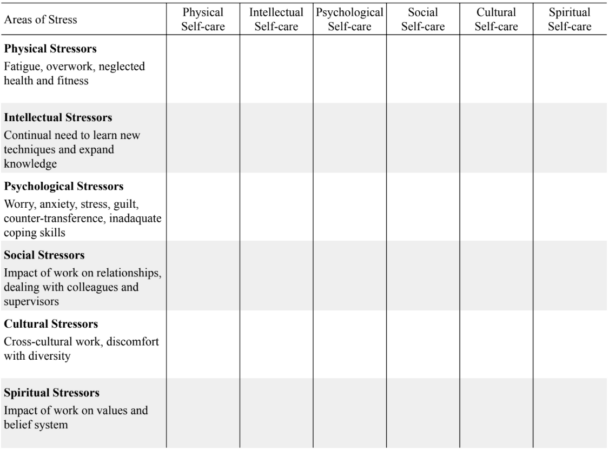Self-care has become a prevalent topic in wellness discussions, but its meaning and importance are often misunderstood. While some view it as a response to systemic stressors and others see it as mere indulgence, the truth lies deeper: self-care should be proactive rather than reactive. At its core, self-care is a mindful, intentional practice that supports overall well-being through dedicated spaces, activities, and mindsets.
Breaking the Burnout Cycle
Many people wait until they reach complete exhaustion before considering self-care. Our society often glorifies overachievement and constant productivity, creating an unhealthy competition of who can maintain the busiest schedule. This mindset perpetuates the myth that taking breaks equals laziness – a dangerous assumption that can lead to burnout.
The chart below provides a comprehensive framework for identifying your stressors and matching them with appropriate self-care activities. The key is understanding that different types of stress require different approaches to self-care. For example:
- If you’re experiencing physical fatigue, combining physical self-care (like regular exercise) with psychological self-care (such as stress management techniques) might be most effective
- When dealing with work relationship stress, you might focus on social self-care activities while also incorporating psychological self-care strategies
- Cultural stressors might require a blend of cultural and social self-care approaches

Moving Beyond Common Misconceptions
While activities like manicures and spa days can be valid forms of self-care, true self-care is about addressing your specific stressors with intentional, targeted practices. It’s not selfish or indulgent – it’s essential for maintaining your ability to function effectively both personally and professionally.
Creating Sustainable Practice
At The Center for Mindfulness & CBT, we believe in helping you develop a sustainable self-care routine that addresses your unique needs across all dimensions of well-being. Remember that self-care isn’t about perfection – it’s about creating regular, intentional practices that support your overall health and effectiveness.
We encourage you to use the chart as a starting point for developing your personalized self-care plan. Consider scheduling a session with one of our therapists to discuss how we can help you implement these strategies in a way that works for your lifestyle and specific challenges.


